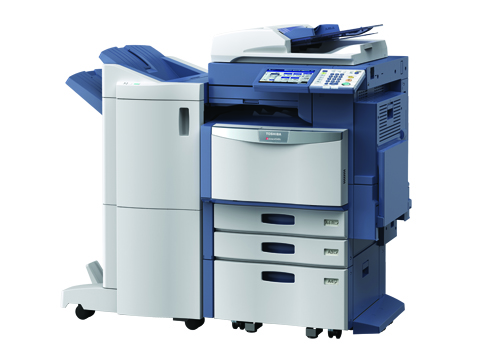
but the machinery designed to carry out that process has become increasingly complex and sophisticated over the last decade or so. Likewise, the copying requirements of schools have become much more diverse with today’s teachers and students undertaking an increasing range of tasks and projects within the school environment.
For schools looking at upgrading their photocopying equipment there are a number of factors to consider when selecting a brand. One is the ability to keep an eye on costs by measuring print volumes. This will enable you to keep track of where and when the highest volume of copying is being generated, and also allow copy paper and toner orders to be made in advance to avoid running out.
Two of the leading suppliers of photocopying equipment in New Zealand were asked what they offer in terms of monitoring ability. Toshiba’s Jim Nolan explains: “Toshiba provides a free onboard administration program called Top Access, allowing the administrator total desktop control over the machine and its usage. Users are given a PIN number and limitations can be attached to this for black and colour printing or copying.
“For more advanced accountability and network control, particularly for colleges and the larger primary schools, the software PaperCut can be utilised allowing for the use of MiFare and HID Student ID cards, and for the staff, security cards or FOB keys.”
Jeremy Lane of Konica Minolta notes that in-built monitoring facilities are standard on their photocopying machines, but they have also been successfully using third-party solutions for the last 20 years.
“External third-party software is connected to our Bizhub MFP and this is particularly effective for out-charging situations, so is very relevant for schools,” Lane says.
While today’s leading photocopier brands are designed to run efficiently, inevitably problems such as paper jams and toner issues will arise, and that’s where a school’s relationship with a service technician is key. It’s important for the technician to be familiar with a school’s particular needs, so dealing with the same person each time is preferable.
“Wherever possible our customer can expect to see the same technician,” says Nolan. “However, this is closely monitored to ensure our customers receive a prompt response to their service request. Toshiba also employs specialist education account managers to look after all inquiries from the education market.
“Training is also a very important aspect for us, and again the specialist account managers undertake to ensure this is completed to the schools’ requirements.”
Konica Minolta employs a territory management system, Lane says, with the service technicians in the various regions around the country developing an ongoing relationship with the contact at the school.
“It’s about maintaining a level of consistency. That means it’s easy for us to make the servicing of equipment pleasing for the school. We are service orientated and we have invested a lot in that with the Sentinel Services model, which is unique to Konica Minolta. When a problem occurs on a machine, an electronic signal is sent directly to the technician’s PDA so he can respond immediately. This closed loop system means no manual intervention is required.”
For most schools, renting or leasing technological equipment is the most common arrangement, and Nolan says with Toshiba equipment this is usually over a three or four-year period. “Five years is also available,” he says, “but is often found to be too long given the speed that technology advances.”
Lane says Konica Minolta offers a range of flexible contract and leasing arrangements through its sister company, Leasing Solutions Ltd.
“We offer special education contracts to help make schools’ purchasing decisions as easy as possible.”
Like their service technicians, Konica Minolta’s account managers also operate on the company’s territory management system, says Lane.
“These dedicated education sales specialists work in regions around the country and build long-standing relationships with their client schools, helping them, move through the different phases of technology as it becomes more complex and advanced.”
Konica Minolta also contributes to New Zealand’s education system through its involvement in school sponsorship and the company has built up long-term relationships with a number of schools around the country, Lane says.
Today’s multi-functional equipment offers far more than just photocopying, giving schools the opportunity to carry out a range of tasks. As Nolan explains: “The Toshiba e-Bridge X series colour machines are capable of printing banners up to 1200mm long, and poster print. In addition, Toshiba offer various supporting software programs, including specialised newsletter packages allowing the newsletter to be run off in classroom sets, Re-Rite OCR software for converting those hard copies or PDF files into instantly editable documents and much more.
“Again our specialist account managers will give full training in order for our customers to gain maximum benefit from today’s technology.
Toshiba is totally committed to after-sales and service, maintaining operational profitability, and ‘working alongside education for a better tomorrow’.”
The much-delayed English draft curriculum is now out for consultation, generating discussion from teachers.
Research from AUT demonstrates arts, culture and recreation have positive impacts on all aspects of…
How effective has the school phone ban been in achieving its aims? Researchers from the…
School camps and excursions deliver hands on learning experiences, helping to consolidate classroom learning.
Innovations in AV technologies present new opportunities to engage with students. We look at how…
A new report from the University of Auckland’s Our Voices Project asks young people what…
This website uses cookies.